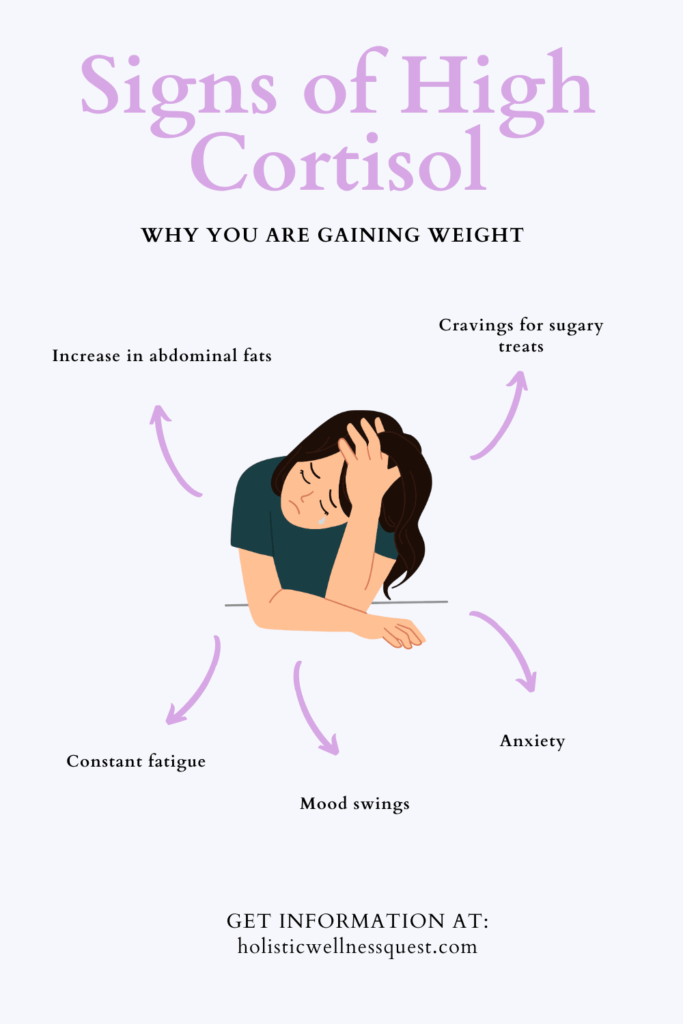The Link Between Cortisol Levels and Weight Gain: How to Stop Weight Gain from Cortisol

You’ve had a stressful day and all you want is a bag of chips. You’re halfway through, then it dawns on you that you’re trying to lose weight. But you still end up clearing the whole bag.
After doing this for a some days, you realize you’ve added some pounds.
Cortisol is the culprit here.
Cortisol, often referred to as the “stress hormone,” is a vital hormone produced by the adrenal glands. While cortisol is essential for regulating your blood sugar, reducing inflammation, and aiding in metabolism, chronic elevation of cortisol levels can lead to weight gain and other negative side effects.
Weight gain associated with chronically elevated cortisol levels is particularly common in the abdominal area, commonly known as “belly fat.” It is necessary to adopt a holistic approach to stop weight gain from cortisol.
Elevated cortisol levels can trigger a cascade of physiological responses that contribute to weight gain.
These responses include increased appetite and the storage of fat, particularly around the abdomen.
Additionally, high cortisol levels can contribute to insulin resistance and high blood sugar levels, which can promote weight gain.
On the other hand, low levels of cortisol may cause weight loss. You need to manage cortisol levels to stop weight gain from cortisol and support overall health.
Introducing stress management techniques and lifestyle adjustments can help individuals control cortisol levels and stop weight gain.
By incorporating strategies to reduce stress and adopt healthier habits, individuals can effectively manage their cortisol levels and achieve their weight management goals.

Key Takeaways:
- Chronic elevation of cortisol levels can lead to weight gain.
- High cortisol levels are associated with increased appetite and cravings for unhealthy foods.
- Elevated cortisol levels can contribute to insulin resistance and high blood sugar levels.
- Managing cortisol levels is crucial for preventing cortisol-induced weight gain.
- Implementing strategies such as exercise and mindful eating can help regulate cortisol levels.
The Role of Cortisol in Weight Gain
Cortisol, often termed the “stress hormone,” plays a pivotal role in your body’s response to stress. When your body perceives stress, cortisol is released to help cope with the situation. However, chronic stress can lead to sustained high levels of cortisol, which can have detrimental effects on health, including weight gain.
The physiological process behind cortisol-induced weight gain is straightforward.
- Elevated cortisol levels can increase fat storage, particularly in the abdominal area, leading to the accumulation of “belly fat.”
- Additionally, cortisol can stimulate appetite and lead to overeating, further contributing to weight gain.
- Chronic stress is closely linked to elevated cortisol levels. When stress persists over time, cortisol levels remain high, promoting weight gain. This creates a vicious cycle where stress leads to elevated cortisol, which, in turn, exacerbates weight gain, creating challenges for weight management.
To break this cycle and stop cortisol-induced weight gain, you should implement strategies to reduce stress and lower cortisol levels. You can effectively reduce cortisol levels and support weight management efforts by incorporating the following stress management techniques:
- Mindfulness
- Meditation
- Regular physical activity
- Adopting a healthy lifestyle that includes balanced nutrition, adequate sleep, and relaxation techniques can further help you manage cortisol levels and promote overall well-being.
By addressing stress and cortisol levels, individuals can take proactive steps towards achieving a healthy body weight and improving their quality of life.
Identifying Signs of Cortisol-Induced Weight Gain
Recognizing the signs of cortisol-induced weight gain is the first step towards managing your cortisol levels and maintaining a healthy body weight. This type of weight gain is often linked to high levels of stress and can significantly impact your health.

Common Symptoms and Signs of High Cortisol Levels
1) One of the most noticeable signs is the increase in abdominal fat, which we know as cortisol belly fat. Unlike other types of fat, cortisol induces belly fat that is particularly stubborn and difficult to lose.
2) You might also experience cravings for sugary or fatty foods. High cortisol can lead to overeating and weight gain, as stress triggers the desire for comfort foods.
3) Feelings of constant fatigue, despite getting enough sleep, can indicate elevated cortisol levels. When your cortisol levels remain elevated, it can disrupt your natural energy balance.
4) High stress levels can also lead to other symptoms like mood swings, anxiety, and difficulty concentrating.
How Cortisol-Induced Weight Gain Differs from Other Types of Weight Gain

Cortisol-induced weight gain primarily affects the abdominal area, leading to an increase in visceral fat. This type of fat is closely linked to metabolic diseases.
Unlike weight gain caused by overeating or lack of exercise, cortisol-induced weight gain can occur even if you’re maintaining a healthy lifestyle. Surprised?
It’s often the body’s response to stress, rather than a direct result of caloric surplus. Stress and cortisol can cause weight gain through mechanisms like hormonal imbalances and changes in metabolism, making it a unique challenge to address.
The Importance of Consulting a Healthcare Provider for Accurate Diagnosis
If you suspect that stress and high cortisol levels are causing weight gain, it’s crucial to consult a healthcare provider.
- They can conduct tests to measure your cortisol levels.
- A healthcare professional can help differentiate if the weight gain is solely due to elevated cortisol or if other factors are at play.
- With an accurate diagnosis, you can develop a targeted plan to reduce your cortisol levels, stop weight gain, and improve your overall health. This may include strategies to lower cortisol levels and lose weight effectively.
In short, understanding the signs of cortisol-induced weight gain and how it differs from other types can empower you to take the necessary steps to manage your stress, reduce your cortisol levels, and stop weight gain assocaited with cortisol.
Consulting a healthcare provider is essential in obtaining an accurate diagnosis and developing a personalized plan to address your specific health needs.
Scientific Insights into Cortisol and Weight Management
Latest research has shed light on the intricate relationship between cortisol and weight gain, providing valuable insights into effective weight management strategies.
Recent Research Findings on Cortisol and Weight Gain
Recent studies have corroborated the link between cortisol and weight gain, highlighting the impact of stress on body composition.
- For instance, one study concluded that chronic stress and elevated cortisol levels are associated with increased abdominal fat deposition and weight gain.
- Another study found that individuals with higher cortisol levels had a greater propensity to gain weight, particularly around the midsection. These findings underscore the significance of managing cortisol levels for weight management.

The Role of Cortisol in Metabolism and Fat Distribution
Cortisol plays a pivotal role in metabolism and fat distribution within the body. How?
During times of stress, cortisol mobilizes energy stores to provide your body with the resources needed to cope with the stressor. This often involves breaking down stored fats and proteins to release glucose into the bloodstream for immediate energy use.
However, chronic elevation of cortisol levels can disrupt metabolic processes, leading to increased fat deposition, especially in visceral adipose tissue (belly fat).
Additionally, cortisol influences fat distribution, favoring the accumulation of fat in the abdominal region.
Understanding these mechanisms is crucial for devising effective weight management strategies tailored to cortisol regulation.
Genetic Influence on Cortisol Levels and Weight Gain Susceptibility
Genetics play a significant role in determining individual variations in cortisol levels and susceptibility to weight gain.
- Certain genetic variants may predispose you to higher cortisol levels in response to stressors, increasing your risk of weight gain.
- Conversely, other genetic factors may confer resilience to stress-induced cortisol elevation, thereby mitigating the risk of weight gain.
For example, a study published in the Journal of Nutrition and Metabolism identified specific genetic polymorphisms associated with altered cortisol metabolism and adiposity. These findings highlight the importance of personalized approaches to weight management. Personalized approaches consider genetic predispositions and customize interventions to optimize cortisol regulation and mitigate weight gain risks.
By synthesizing these scientific insights, individuals can gain a deeper understanding of the complex interplay between cortisol and weight management. These insights empower them to make informed decisions and adopt effective strategies for achieving and maintaining a healthy body weight.

| Effects of High Cortisol Levels on Weight Gain | Associated Factors |
|---|---|
| Promotes fat storage, especially in the abdomen | Elevated cortisol levels |
| Increases appetite and cravings for unhealthy foods | Chronic stress |
| Contributes to overeating, particularly of sweet, fatty, and salty foods | Metabolic syndrome |
| Linked to obesity and abdominal fat accumulation | Insulin resistance |
The Relationship Between Cortisol and Overall Health
Cortisol not only plays a role in weight gain but also has implications for overall health. Chronic elevation of cortisol levels can lead to a variety of health issues. These include:
- High blood pressure
- Type 2 diabetes
- Cardiovascular disease
- Impaired immune function
- In addition to weight gain, high cortisol levels have been associated with symptoms such as fatigue, mood changes, and difficulty concentrating.

Natural ways to Lower Cortisol Levels and Stop Weight Gain
How can you lower you cortisol levele and stop weight gain?
There are several strategies you can implement to manage cortisol levels and prevent weight gain. By incorporating these techniques into your daily routine, you can reduce stress and maintain a healthy lifestyle.
Regular Physical Activity to Stop Cortisol Weight Gain
Engaging in regular physical activity is an effective way to lower cortisol levels and promote weight loss. How does it work?
Exercise stimulates the release of endorphins, which are known as “feel-good” hormones. Endorphins are natural stress-relievers, which help manage stress.
Aim for at least 30 minutes of moderate-intensity exercise, such as brisk walking or cycling, most days of the week.
Find activities you enjoy, whether it’s walking, cycling, dancing, or yoga, to make exercise a regular part of your lifestyle.
Mindful Eating to Lower your Cortisol Levels
Mindful eating is another powerful tool for stopping weight gain caused by stress and cortisol. Pay close attention to your hunger and fullness cues, and avoid distractions during meals.
So, instead of reaching for comfort foods, choose wholesome, nutrient-dense foods that nourish your body. Include foods such as fruits, vegetables, whole grains, lean proteins, and healthy fats in your diet.
Mindful eating can prevent overeating and promote a healthier relationship with food.

Seek Guidance from Professionals
If you find yourself struggling with emotional eating or making healthy food choices, consider seeking guidance from a therapist or dietitian.
These professionals can provide support, help you develop healthier eating habits, and manage emotional eating triggers.
Prioritize Sleep to Manage your Levels of Cortisol
Adequate sleep is essential for managing cortisol levels. Lack of sleep or poor sleep quality can lead to elevated cortisol levels and increased stress.
Aim for 7-9 hours of quality sleep each night to optimize cortisol regulation and overall well-being. Create a relaxing bedtime routine, avoid screens before bed, and ensure your sleeping environment is conducive to restful sleep.
Practice relaxation techniques like meditation or deep breathing exercises to reduce overall stress levels. These activities can help lower cortisol levels and promote a sense of calm.
Reduce Stress Levels to Manage Cortisol Levels and Weight Gain
Reducing overall stress levels is crucial for preventing cortisol-induced weight gain. Consider incorporating stress-reducing activities into your daily routine. This can include:
- Engaging in hobbies
- Spending time in nature
- Meditation
- Deep-breathing exercises Practicing yoga
- Seeking support from friends and family
For instance, meditation allows you to focus your mind and cultivate a sense of calm, effectively lowering cortisol production.
Similarly, practicing mindfulness involves being present in the moment, which can alleviate stress and prevent cortisol spikes.
On the other hand, deep-breathing exercises activate the body’s relaxation response, counteracting the effects of stress hormones.
In summary, by implementing strategies such as regular physical activity, mindful eating, seeking guidance from professionals, prioritizing sleep and relaxation, and reducing overall stress levels, you can effectively manage cortisol levels and stop weight gain. These lifestyle changes promote overall well-being and minimize the negative effects of cortisol on the body.
Nutrition and Supplementation for Healthy Cortisol Levels
Managing cortisol levels through nutrition and supplementation is a proactive approach to support overall health and stop weight gain associated with chronic stress.
Specific Nutrients and Foods for Stress and Cortisol Management:
Incorporate foods rich in nutrients known to help regulate cortisol levels. These include:
1) Vitamin C: Found in citrus fruits, strawberries, bell peppers, and leafy greens, vitamin C supports adrenal gland function and helps mitigate the effects of stress.
2) Magnesium: Foods like almonds, spinach, avocados, and legumes are rich in magnesium, which plays a role in cortisol regulation and relaxation.
3) Omega-3 fatty acids: Fatty fish such as salmon, walnuts, flaxseeds, and chia seeds contain omega-3s, which have anti-inflammatory properties and may help reduce cortisol levels.
In short, aim to include a variety of these nutrient-dense foods in your diet to support healthy cortisol levels and overall well-being.

Cortisol-Lowering Supplements:
While dietary adjustments can play a significant role in cortisol management, some individuals may benefit from supplementation. It is important to note, discussing with a healthcare professional before starting any supplements is crucial to ensure effectiveness and safety.
Ccertain supplements, such as ashwagandha, rhodiola rosea, and phosphatidylserine, have shown promising results in reducing cortisol levels and alleviating stress.
However, it’s essential to choose reputable brands and follow recommended dosages to avoid adverse effects and interactions with medications.
Practical Dietary Tips for Managing Stress Hormone Cortisol:
By incorporating nutrient-rich foods, discussing supplementation options with a healthcare professional, and adopting practical dietary habits, individuals can effectively manage cortisol levels, reduce stress, and support overall health and well-being.
Remember to prioritize a balanced approach to nutrition and consult with a healthcare provider for personalized recommendations.

Conclusion
Managing cortisol levels and preventing cortisol-induced weight gain is crucial for maintaining a healthy lifestyle. Chronic elevation of cortisol levels can lead to weight gain and various health issues.
By implementing strategies such as regular physical activity, mindful eating, stress reduction techniques, and adequate sleep, you can effectively manage cortisol levels and maintain a healthy weight.
Regular physical activity not only helps you reduce stress levels but also promotes weight loss. Exercise stimulates the release of endorphins, which are natural mood enhancers, and can help manage stress.
Mindful eating is another effective tool you can use to manage weight gain due to stress. By paying attention to hunger and fullness cues and making healthful food choices, you can prevent overeating.
Additionally, seeking guidance from a therapist or dietitian can provide support and guidance in managing emotional eating and making healthful food choices.
Getting enough sleep, practicing relaxation techniques like meditation, and reducing overall stress levels can also help you lower cortisol levels and prevent cortisol-induced weight gain.
By taking proactive steps to manage cortisol, individuals can prevent weight gain and improve their overall health.
And remember to be kind to yourself as you journey through managing cortisol levels.
FAQ
How does cortisol contribute to weight gain?
Cortisol is a hormone produced in the adrenal glands that, when elevated chronically, can lead to weight gain. High cortisol levels have been associated with increased appetite, cravings for unhealthy foods, and the accumulation of belly fat.
What are the symptoms of high cortisol levels in females?
Symptoms of high cortisol levels in females may include weight gain, particularly around the abdomen; increased appetite and cravings for unhealthy foods; fatigue; mood changes; and difficulty concentrating.
Can cortisol levels affect weight loss?
High cortisol levels can make it difficult to lose weight. This is because high cortisol can promote overeating and cause metabolic changes that contribute to weight gain. On the other hand, low cortisol levels may cause weight loss, but more research is needed in this area.
How can I lower cortisol levels to prevent weight gain?
There are several strategies that can help lower cortisol levels and prevent cortisol-induced weight gain. These include regular physical activity, mindful eating, stress reduction techniques such as meditation and relaxation, adequate sleep, and seeking guidance from a therapist or dietitian.
What is the relationship between cortisol “Stress Hormone” and overall health?
While cortisol is necessary for various bodily functions, chronic elevation of cortisol levels can lead to a range of health issues. These may include high blood pressure, type 2 diabetes, and cardiovascular disease. Additionally, chronic elevation of cortisol impairs immune function, and symptoms such as fatigue, mood changes, and difficulty concentrating.
How can I prevent weight gain and maintain a healthy lifestyle?
To prevent weight gain and maintain a healthy lifestyle, it is important to manage cortisol levels and reduce stress. This can be achieved by implementing strategies like regular physical activity, mindful eating, stress reduction techniques, and getting enough sleep. Making positive lifestyle changes that promote overall well-being is key to preventing cortisol-induced weight gain and improving overall health.